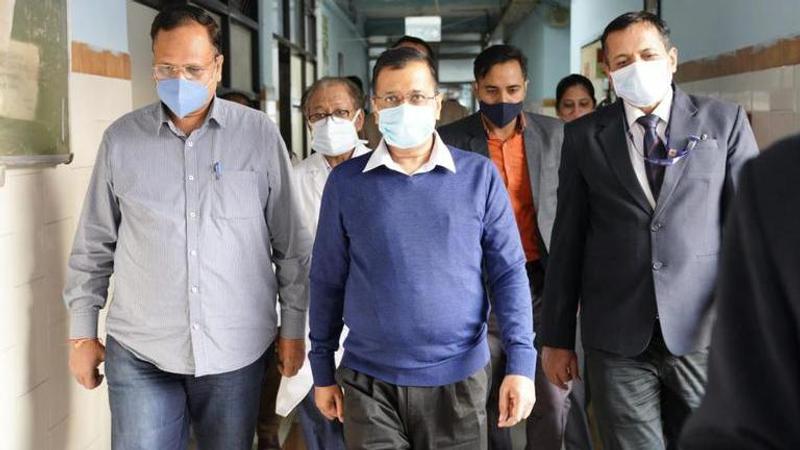Published 19:01 IST, November 27th 2020
Centre in SC blames Delhi govt for rise in COVID cases, says no steps taken despite exhortations
The Centre on Friday blamed Delhi government for rising COVID-19 cases in the national capital and said that despite “repeated exhortations” it did not take steps to enhance testing capacity, particularly for RT-PCR, which remained static at around 20,000 tests for a long time.

The Centre on Friday blamed Delhi government for rising COVID-19 cases in the national capital and said that despite “repeated exhortations” it did not take steps to enhance testing capacity, particularly for RT-PCR, which remained static at around 20,000 tests for a long time.
The Centre said that Delhi government was well aware that the confluence of winter, festival season and pollution were likely to witness a surge in cases and this foreknowledge ought to have led to strict enforcement and Information, Education and Communication (IEC) measures being instituted well in time but this was not done.
In its affidavit, filed before the top court, the Ministry of Home affairs (MHA), said “while there were regular advertisements on achievements of Delhi Government, including on dengue prevention and control, no ads on COVID appropriate behaviour were to be seen. The people, at large, were also not apprised about this through regular outreach measures”.
It said, “That despite repeated exhortations in the wake of rising COVID-19 cases, the Delhi Government did not take steps to enhance testing capacity, particularly for RT-PCR, which remained static at around 20,000 RTPCR tests for a long time”.
A bench of Justices Ashok Bhushan, R S Reddy and M R Shah took the Centre’s affidavit on record and observed that “Things are going from bad to worse but no concrete steps are being taken.
States will have to rise above the politics. All states will have to rise to the occasion,” the bench said while posting the matter for further hearing on December 1.
The Centre said that despite issuing several elaborate and exhaustive guidelines for containment and prevention of the infection and for ensuring proper treatment of COVID patients, Delhi government saw its first wave of Coronavirus infection in the month of June-July and the union government immediately had to take pro-active and pre-emptive steps to control further spread of Covid-19.
The Centre pointed out that to deal with the shortcomings, which lead to a massive increase in the COVID infection and the increasing strain on the capacity of medical infrastructure in the hospitals of Delhi, the Union Home Minister Amit Shah was constrained to call another meeting on November 15 to review the situation in the national capital.
It said that even now, “after it was committed that GNCTD would increase ICU (non-ventilator) beds by around 2,680, the Chief Minister, vide its letter dated November 19, 2020 addressed to the Union Home Minister, has expressed his inability to enhance ICU beds in the Delhi (State Government and private) hospitals by more than around 912, and has asked the Central Government to create the additional 1,700 ICU beds”.
It said that several meetings were held by cabinet secretary, union home secretary and health secretary with all concerned officials of Delhi government, municipal bodies and others to review the status of COVID-19 management and it was emphasised that all steps be taken to contain the situation in Delhi.
The Centre pointed out that despite constant monitoring by the MHA about scrupulous compliance of the directions by Delhi government various short-comings, going into the root of the matter, were noticed in the implementation of the program.
It said that thereafter a series of review meetings chaired by the Union Health Secretary were held from July 8 to November 13 and several issues were regularly emphasized to the Delhi government.
The affidavit highlighted the shortcomings which include conversion of more beds into oxygenated/ventilator supported beds, strict perimeter control of containment zones, and more testing and especially through the RT-PCR method, to ensure that COVID positive persons are detected early and medical response can be given.
The Centre said that several other issues which were flagged in the review meetings include that Delhi must monitor requirement of ambulances and other infrastructure so that no patient remains untreated and responded to and in view of the approaching festival period, marriage season and winter climatic conditions, GNCTD shall act proactively and thoroughly act according to the guidelines.
“In addition, Cabinet Secretary also reviewed the COVID19 situation in 08 States/UTs including NCT of Delhi which constitute of 62 per cent of the nationwide active cases and 61 per cent of the total deaths, through Video conference on November 11”, it said, adding that it was emphasized on strict implementation of guidelines for COVID and rigor of containment measures.
Detailing the shortcomings found on the part of Delhi government, the Centre said that no effective preventive steps to contain the infection were taken despite the recommendation of high power committee headed by Dr V K Paul, member NITI Ayog, which said that Delhi should plan for a surge of around 15,000 cases per day and accordingly provide for about 6,500 ICU beds.
It said that the Delhi government did not take any timely measures to increase the ICU beds from the present level of around 3,500, thus causing a sudden pressure to come on the health and medical infrastructure in Delhi.
The Centre said that even patients who were under home isolation were not properly traced and/or their contacts were also not traced effectively.
(Photo Credit: Twitter/CMODelhi)
Updated 19:01 IST, November 27th 2020




